|
Railroad Telegraph Stories
from Tom Shepherd |
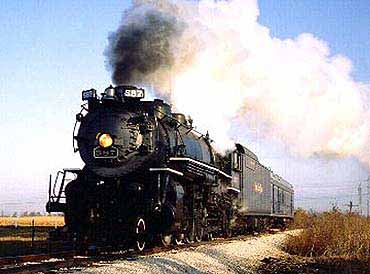 |
INTRODUCTION
Hello railroaders and telegraphers!
Tom Shepherd is my name and I am 81 years old. I hope you will enjoy
reading about my railroading memories as much as I have enjoyed
writing them!
Something amazing happened on July 4th, 2008. I went to an
antique sale in Spirit Lake, Iowa and unexpectedly discovered the
very telegraph key I had used on the Illinois Central Railroad 66
years ago. It was like a miracle! I had made a special mark on
it with a hammer and nail, but when I quit the railroad, I left it
behind since the telegraph key did not belong to me. I paid
$30.00 for my treasure. A small brass emblem is nailed to it that
reads "Central Scientific Co. Laboratory supplies, Apparatus,
Chemicals, Chicago, Illinois.
Wow! I took it home and dit dahed for hours! Memories of my
telegraph days, working for the ICRR, and attending the Navy (NTSCH)
School at the University of Wisconsin in Madison came flooding
back to me. To make a letter "V", I was taught to say, "Dit dit
dit dah. Hedy Lamar. Dit dit dit dah. Hedy Lamar. Dit dit dit
dah. Hedy Lamar." Hedy Lamar was a famous movie star in the
1940's and saying her name provided the proper space between the
telegraphed words.
Hang on going through the flying switches, do not step on any rails,
watch out for hot boxes, and leave the signal down!
ALL ABOARD!
Around 1935 I lived on Fowler Street in Waterloo, Iowa, about ten
blocks from the ICRR round house. There was a sharp curve in the
tracks a few blocks from our home. When the steam engine blew the
whistle, all the neighborhood kids grabbed a bucket and headed for
the sharp curve in the tracks. Pieces of coal would always fly
off the engine at the curve. Sometimes I think the fireman
shoveled off coal for us at that curve! I learned to fist fight
at an early age to get my share of the coal from older kids. Back
then, everyone heated their house with coal and times were tough
in America.
When I graduated from the ninth grade at Edison School, my mother said,
“Where are you going to work, Tommy?" I replied, "I am going to
West Junior High with some of my friends." I enrolled at West Jr.
and attended a class taught by the Illinois Central Railroad. I
thought it would be a fun class and interesting to learn
telegraphy. The teacher was a pleasant, retired ICRR Depot
agent. Because I learned International Morse Code so quickly, I
became head of the class. The teacher also appreciated my
superior handwriting. It was extremely important to write perfect
railroad-style penmanship so there would be no mistakes in
railroad train orders. I can still write in that style to this
day!
I was 14 years old and the only student the railroad hired. I was
needed because all the young agents had been drafted into the army
and the older ones needed some time off. A car would pick me up
after school on Friday afternoon and drive me to a depot to work
for the weekend. The railroad always found a place for me to stay
and must have paid for my room and board. I really delighted in
riding the steam engine back home on Sunday afternoon. The
engineer said to me, "Hang on, Tom, when we hit a flying switch!
I quit school and started to work full time when I turned 15. I
worked in the Eastern division which was from Waterloo to Dubuque,
Iowa and included the East Dubuque Tower in East Dubuque,
Illinois. I operated the bridge owned by the ICRR that spans the
Mississippi River in Dubuque.
MASONVILLE
Early in my career as a telegraph operator, the Illinois Central Railroad sent me
to work in Masonville, Iowa. Although small, Masonville was a great railroad town
and known as “the main line of mid-America”. In 1995, I traveled through Masonville
and the depot was still standing. I got out of my car and stared at the building
and platform for a long time. It was to me a wonderful sight!
During the time I worked there, the railroad found me a place to stay in town and paid
for my board and room. I was replacing a depot agent who had been drafted into the
army and lived with his wife and two young daughters. I do not know how much she was
paid, but I was always very well fed!
The depot was furnished with a table, four chairs, a desk for my telegraph equipment,
and a steel safe which held a loaded revolver. My instructions were to not touch the
revolver even if the depot was robbed. “Let them have whatever they want and save yourself!”
I could see the platform and down the tracks through a large bay window. A few pictures
adorned the wall and the floor was brick tile. The levers for the signal tower were in
the corner towards the tracks. Outside were two flatbed carts used to load up baby
chicks and miscellaneous goods sent through the Parcel Post. I received pay for
anything I handled for the Parcel Post Company and for any Western Union telegraphs I sent.
The daily train from Waterloo, Iowa to Dubuque, Iowa and back always stopped and unloaded
goods purchased by farmers and the townspeople. The conductor’s name was Mr. Sullivan. He
was a very kind man and always answered any of my questions. Mr. Sullivan endured one of
the worst tragedies I could ever imagine. He lost all five of his sons on the same day in a
Navy battle in the South Pacific.
The walls of his caboose were lined with posters of Hedy Lamar, Betty Grable, Lana Turner and
other 1940’s movie stars. Mr. Sullivan said to me, “Tommy, you stay out of the caboose, because
I’m afraid I would get in trouble if I let you see those pin-ups!” And you guessed it. When Mr.
Sullivan went into town for something, I looked inside the caboose. All the movie stars
in the pin-ups were wearing full length bathing suits! Times sure have changed.
One summer day, the dispatcher from Waterloo let me know tracks had washed out somewhere on the
line and trains from New Orleans, San Francisco, and Los Angeles would be coming to Masonville.
The three passenger trains could not be left on the main track, because a meat train was coming
from Rath Packing Company in Waterloo, Iowa. Meat trains had the right of way over all other
trains, including passenger trains. All the cars were loaded with meat packed in ice and heading
for the Armed Services. Because of the summer heat, water would pour out of the cars from the
melting ice.
After I managed to get the trains off the main line and onto the sidings, all three conductors came
into the depot and were surprised to see such a young agent. They were all dressed in
their magnificent uniforms and I felt as though I had three kings in my depot! I introduced
myself, and since it was noon, mustered up the courage to ask if they would like to have lunch
with me. The woman I boarded with had just brought my lunch and always provided enough food
to last all day. We feasted on sandwiches made with fresh homemade bread and coffee. All three
conductors sat down, I shared my lunch, and we had a good time visiting with each other.
Later, the conductor of the New Orleans passenger train wrote to Mr. Johnson, the President of
the ICRR, about what a good job I did getting three passenger trains on and off the siding and
that I had even shared my lunch with them. Mr. Johnson then wrote a letter to my mother and told
her about the event and how competently I was handling the trains.
One day the dispatcher called to tell me we had a train order for the meat on its way. I told
him I could already see the smoke, so the order had to be short. He started to dictate
the order and it was a long one. As I wrote the order in railroad-style handwriting and read
it back to him, I could hear the train coming. After an order was taken, it was folded up,
put into a string loop and pulled closed. The string was then fastened on a Y-shaped wooden
holder. As the train passed by, I would stand on the platform and hold the wooden holder with
both arms toward the tracks. The fireman or brakeman would then stick out his arm and catch the
message in the string. It was quite dangerous because you stood only a few feet from the engine.
Usually I had plenty of time to get ready, but today I had not a minute to spare.
In my rush, I forgot the platform was gravel and slid right into the engine. The meat trains
had a huge engine and traveled at 100 miles per hour. The Y-shaped message stick hit the
engine and knocked me down and back onto the platform. The train was stopped and the fireman
and brakeman came running back to the platform. They were sure I had been killed. The ICRR always
investigated any accident and it was determined to be the dispatcher’s fault, not mine.
I enjoyed working at the Masonville depot, because there was always something happening… a
lot of Parcel Posts and Western Union telegraphs. One week my paycheck was $75! I told my mother
and she could hardly believe it. She worked at the Rath Packing Company in Waterloo and made
$37.50 for six days of hard labor.
When I had to leave the Masonville depot, I said goodbye to the lady of the house and the two
little girls. I almost cried. I had run the depot for nearly a year and it was hard to leave.
The ICRR then sent me to Epworth, Iowa.
EPWORTH
Epworth, Iowa was a stop on the Illinois Central Railroad only because
there
was a Catholic Monastery located there. I was sent to Epworth because
it had
been raining pitch forks and hammer handles for days and miles of
track had
washed out in the Epworth and Dubuque area. The ICRR found me a
wonderful
German couple to stay with on their farm. She was an excellent cook
and even
got me to like hot potato salad! I always helped milk cows early in
the
morning before I went to work.
The depot was a small, ten foot by ten foot building housing one
chair, a
built-in desk, and a switch board. Wasps had filled all the holes in
the
switch board. I immediately hooked up my key and waited to hear from
the
dispatcher.
A monk from the monastery came to the door my first day and wanted
telegrams
sent to Chicago. Another monk had passed away and the family in
Chicago
needed to be notified. I made a nice amount of money that day sending
and
receiving telegrams.
One day I was sent a message that a work train was on its way from
Alabama
and someone was needed to take train orders. The Western Union
telegraphers
in Chicago used side winder keys and I could not copy that fast
without a
typewriter. I keyed them to slow down. That made them angry and they
REALLY
slowed down. The dispatcher in Waterloo let me know the train would be
there
in a few days. When it arrived, I found the overseer and told him I
was
available to take train orders for him when he needed to move the work
train. The railroad had an outhouse set up for me and gave me a set of
pole
climbing hooks. When the work train needed a work order to move, I put
the
hooks on my shoes, climbed up a telephone pole, clipped on my key, and
called the dispatcher in Waterloo. I would maybe climb a pole two or
three
times a day.
The work train was made up of an engine, a caboose for the overseer,
four
sleeping cars, one cook-house car, and several flat cars that held
tools and
supplies, including extra track, spikes, railroad ties, and anything
needed
to repair the track. The workers included fifty to seventy-five black
men
and about twenty black women who did the cooking and cleaning. They
had been
given strict orders to have no contact with me. The workers set up
their own
toilets and were very organized. When they spoke I could not
understand
them. It sounded like some kind of gibberish to me. The overseer was a
white
man about 6'4" tall. He wore leather pants, a loaded pistol, and had a
leather whip about ten feet long wound up and hooked on his belt. One
day I
asked him how much the ICRR pays the workers. He said," Nothing. The
ICRR
pays me and I furnish their food (which was mostly beans and corn
bread) and
then pay the workers what I think they are worth." When he was near,
the
men worked really hard. They drove spikes in pairs and would sing
songs and
never miss the spikes. It was a beautiful thing to see.
EAST DUBUQUE
I had been on the job in Epworth only about two months when the
dispatcher in Waterloo called to say I was being sent to the East
Dubuque Tower in East Dubuque, Illinois to train for two weeks.
Then if the agent thought I could handle the job, I would take
over the Tower.
Arriving in Dubuque was a little scary for me and worrying about
my new assignment didn't help matters. The weather was very hot
and the mayflies were so thick the snow plows were sent out to
clear the streets. The railroad made arrangements for me to stay
in a hotel in Dubuque. East Dubuque, Illinois, at that time, had
a bad reputation for drinking and gambling so the ICRR kept me
across the Mississippi River in Dubuque, Iowa.
The agent in charge of the Tower trained me for two weeks and
never showed up for work the third week. I called the dispatcher
in Waterloo and he told me "Tommy, you are the new agent for the
East Dubuque Tower. Congratulations!"
The inside of the tower had a single row of levers to move
switches on the tracks and the lighted track layout on the wall
was across from the switches. I had to leave the tower and go
upstairs into another small building to open the middle
section of the railroad bridge when tug boats wanted through. One
morning I was watching the lighted track layout and a train was
coming through the tunnel, its lights blinking along the board. I
had received no message from the train on my key and, heaven
forbid, another set of lights were blinking from the opposite
direction. I had to make a split second decision so I switched
the track and ran one train into the ditch to prevent a head-on
collision. It turned out to be the maintenance man on his
four-wheel railroad cart and in the ditch he went. He could have
been killed, but was OK. The railroad did another investigation
and determined it was not my fault. The maintenance man should not
have been on the track or should have keyed me ahead of time.
Mr. Johnson, the president of the railroad, called me and said,
"Tommy, I have received only good reports about you. Keep up the
good work. The accident was not your fault. You had to do what you
did to prevent a head on collision."
I really enjoyed running the Tower. Things were now going smooth
again and I was enjoying doing a lot of telegraphy work and
helping trains make it across the bridge when a tug boat showed
up, blew his whistle, and wanted me to open the middle section of
the bridge for him to pass. It had been raining for weeks, the
river was high and rushing towards New Orleans. I went up into the
bridge tower and pulled the controls to open the center section of
the bridge. Unbelievably, he missed the opening and hit the
bridge! It knocked a hole in a barge large enough to drive a car
through.
The bridge started shaking and shimmying. I called the dispatcher
in Waterloo and told him what happened. He said, "Tommy, get off
that bridge NOW!" He thought it was going to fall down so I ran
out on the deck and jumped to the ground. You guessed it - another
investigation.
My birthday was soon approaching and I traveled back to Waterloo
to join the Navy. All my friends were going into the service and I
thought it would be the thing to do. To join the service under the
age of eighteen required the signature of a parent, so my mother
signed and I was enlisted on my 17th birthday. I was sent to the
Great Lakes Navy Training Center near Chicago, Illinois. After
taking a test which included some Morse Code, the Chief Petty
Officer took me into his office and said, "Sailor, you are going
to the University of Wisconsin Radio School!"
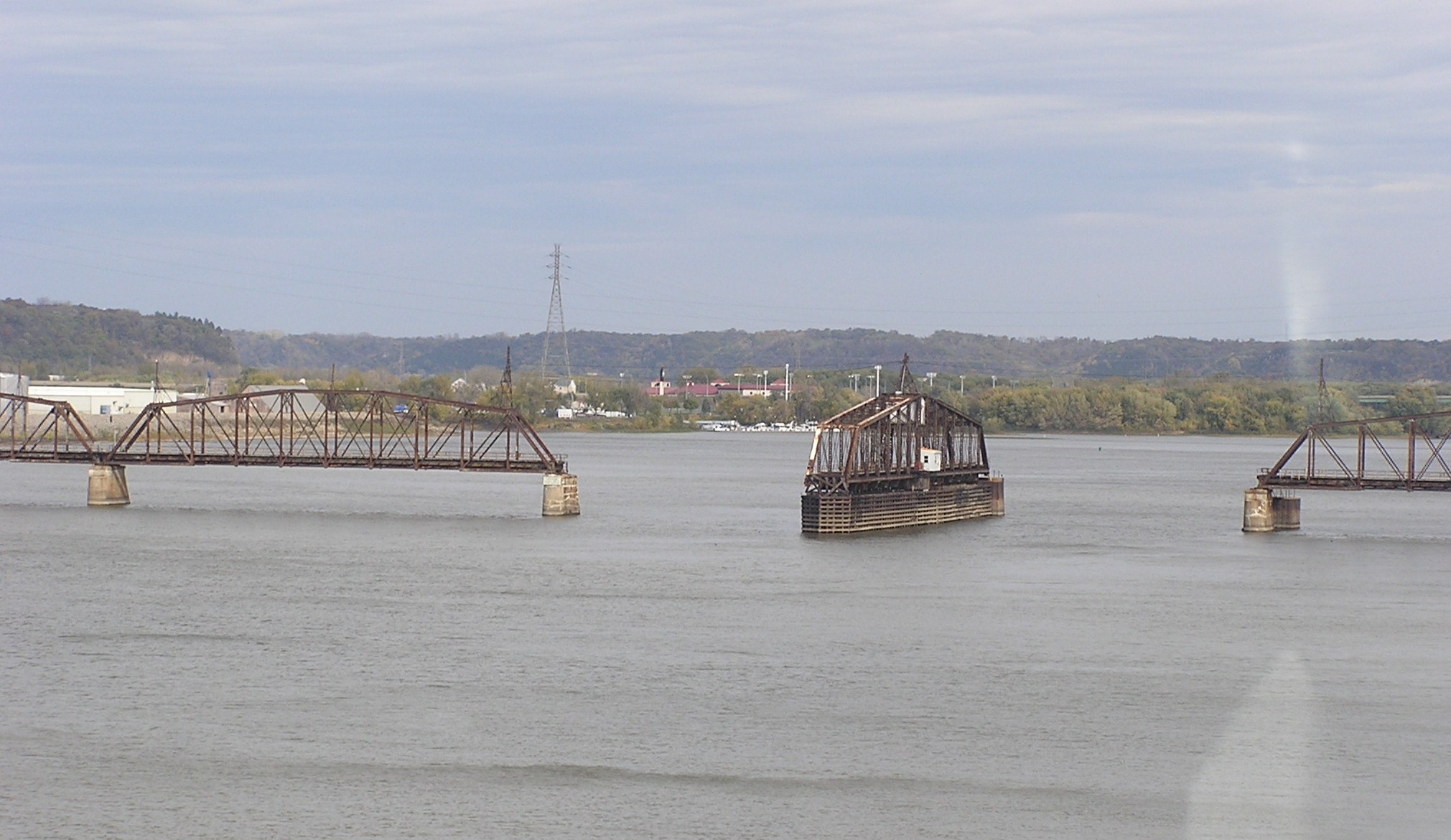
The railroad bridge spanning the Mississippi
River. This is the bridge I had to open to allow
boats to pass through.
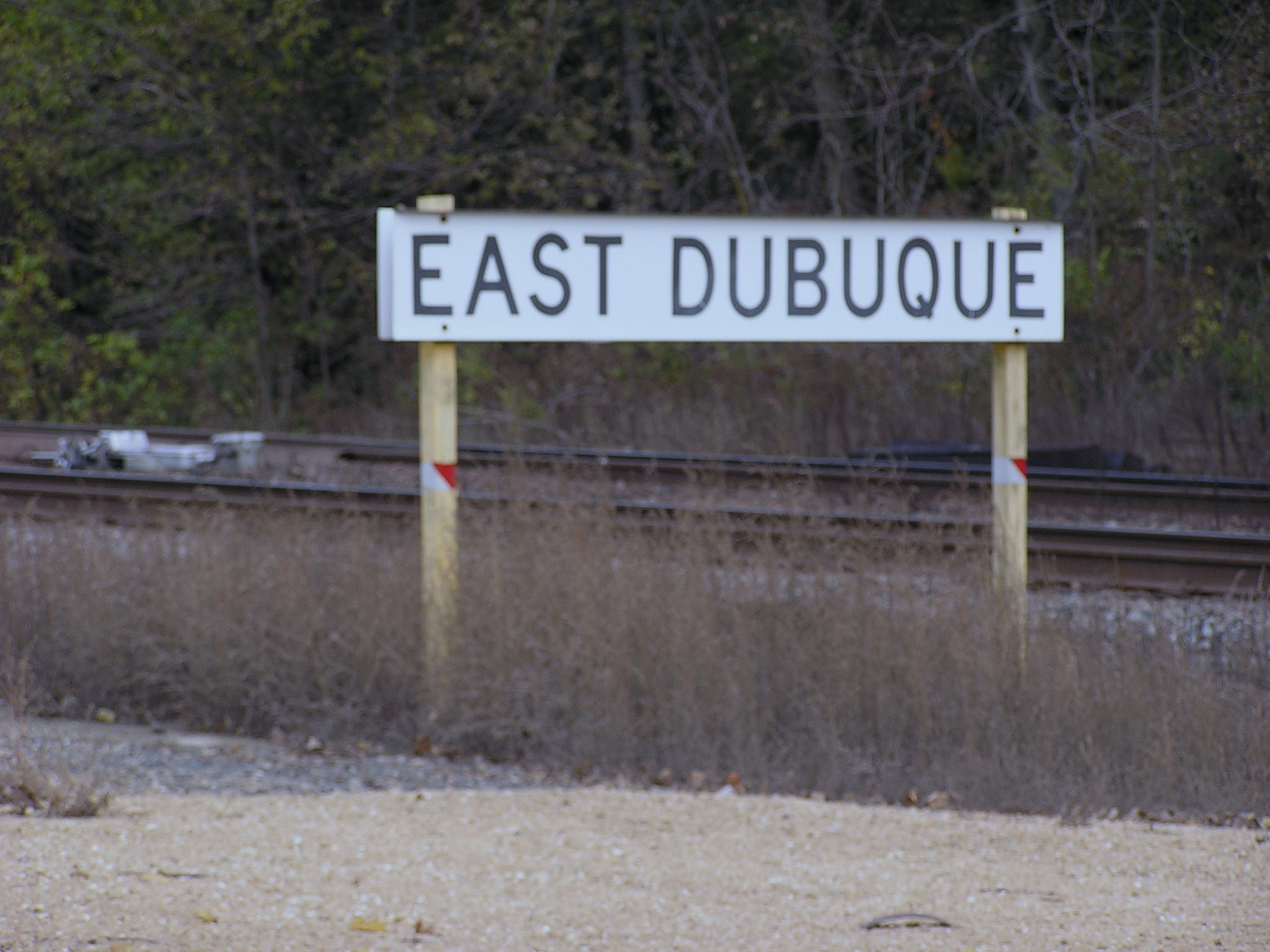
The sign next to the tracks near what is now the
office for train maintenance workers.
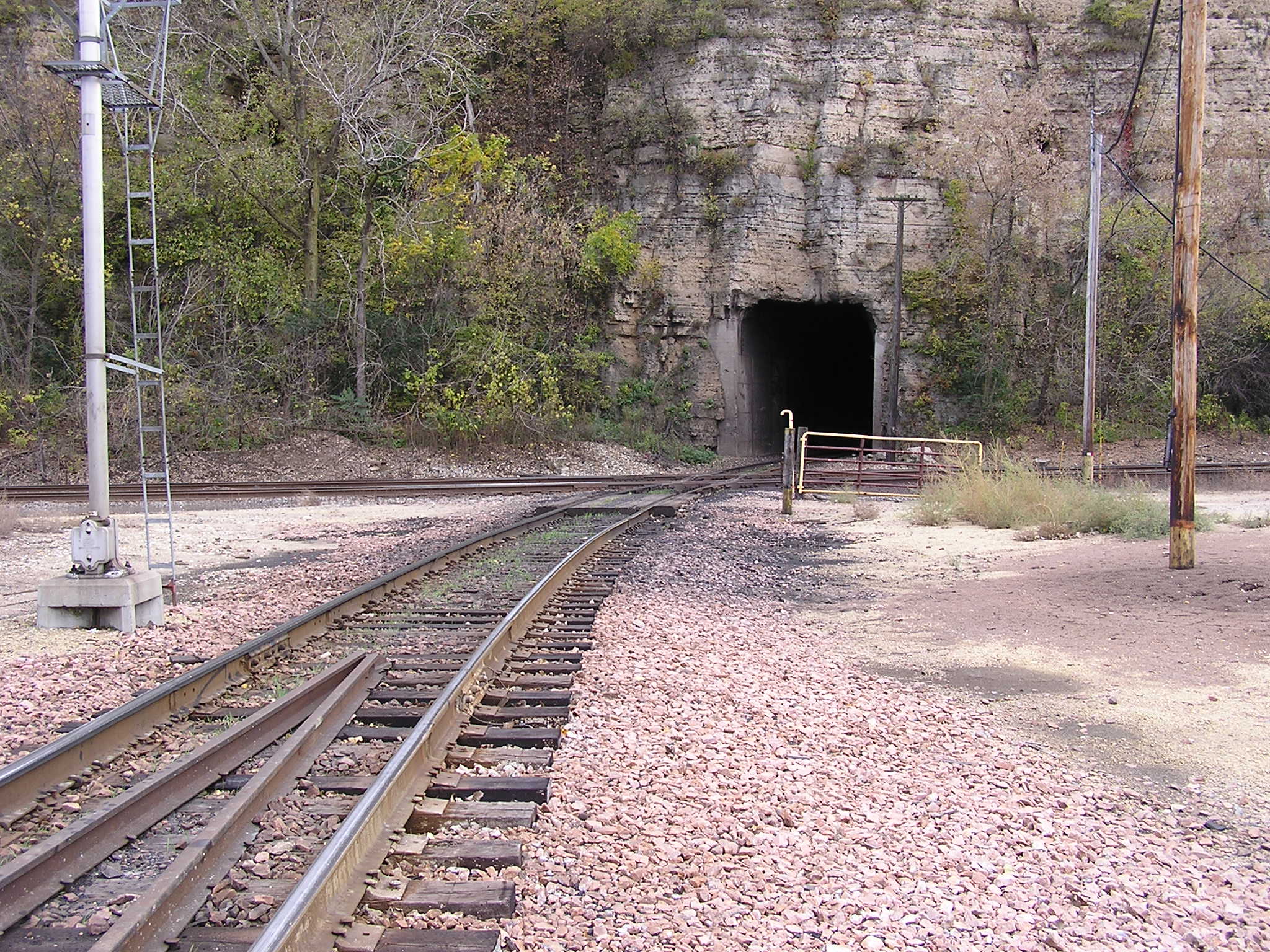
The west opening of the railroad tunnel where the
lighted track layout showed two trains approaching
the tunnel in a head-on collision.
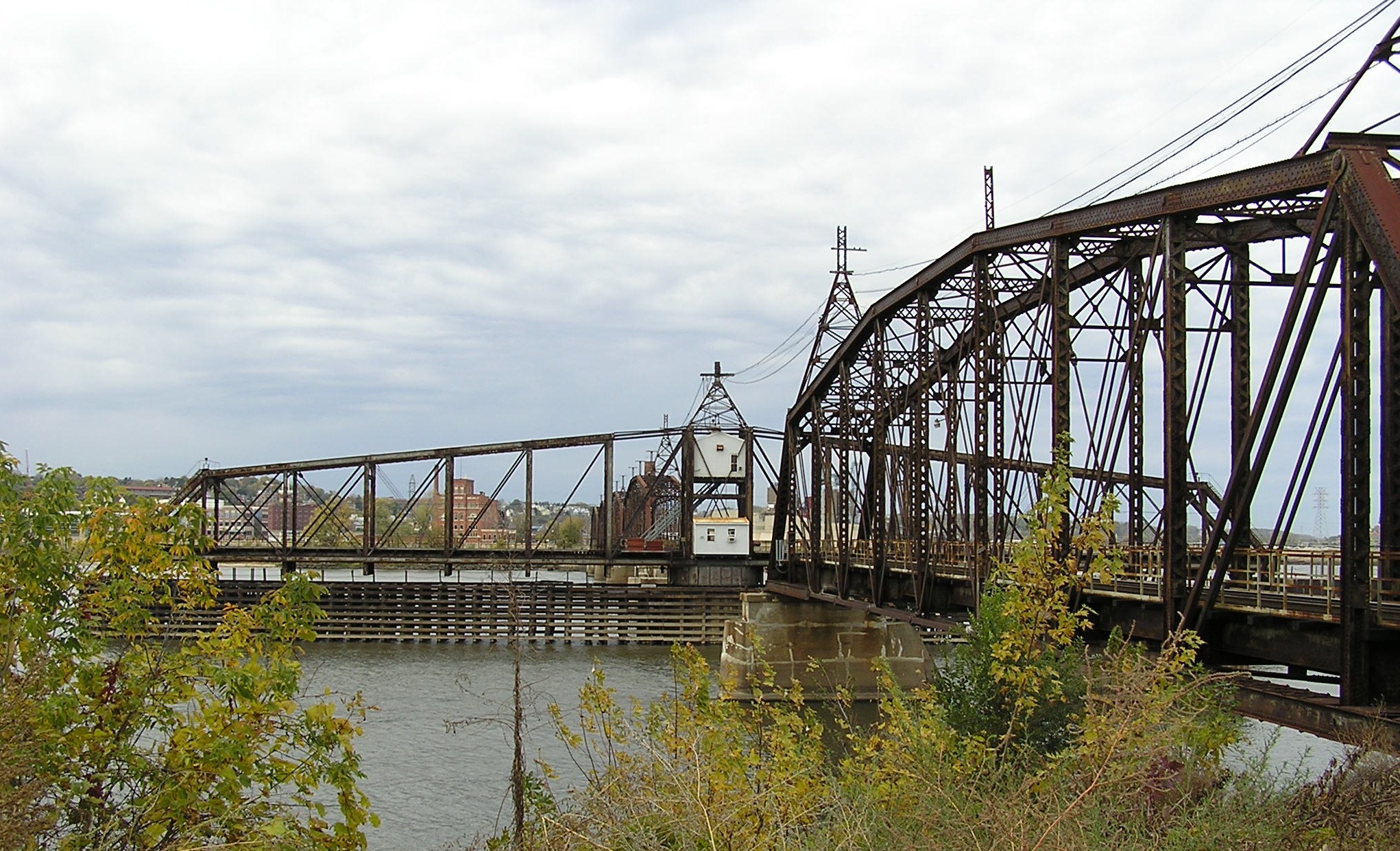
The small, white lower building is where I operated
the switches to move the tracks and which housed the
lighted track layout. I would go upstairs to the upper building to
open the middle section of the bridge.
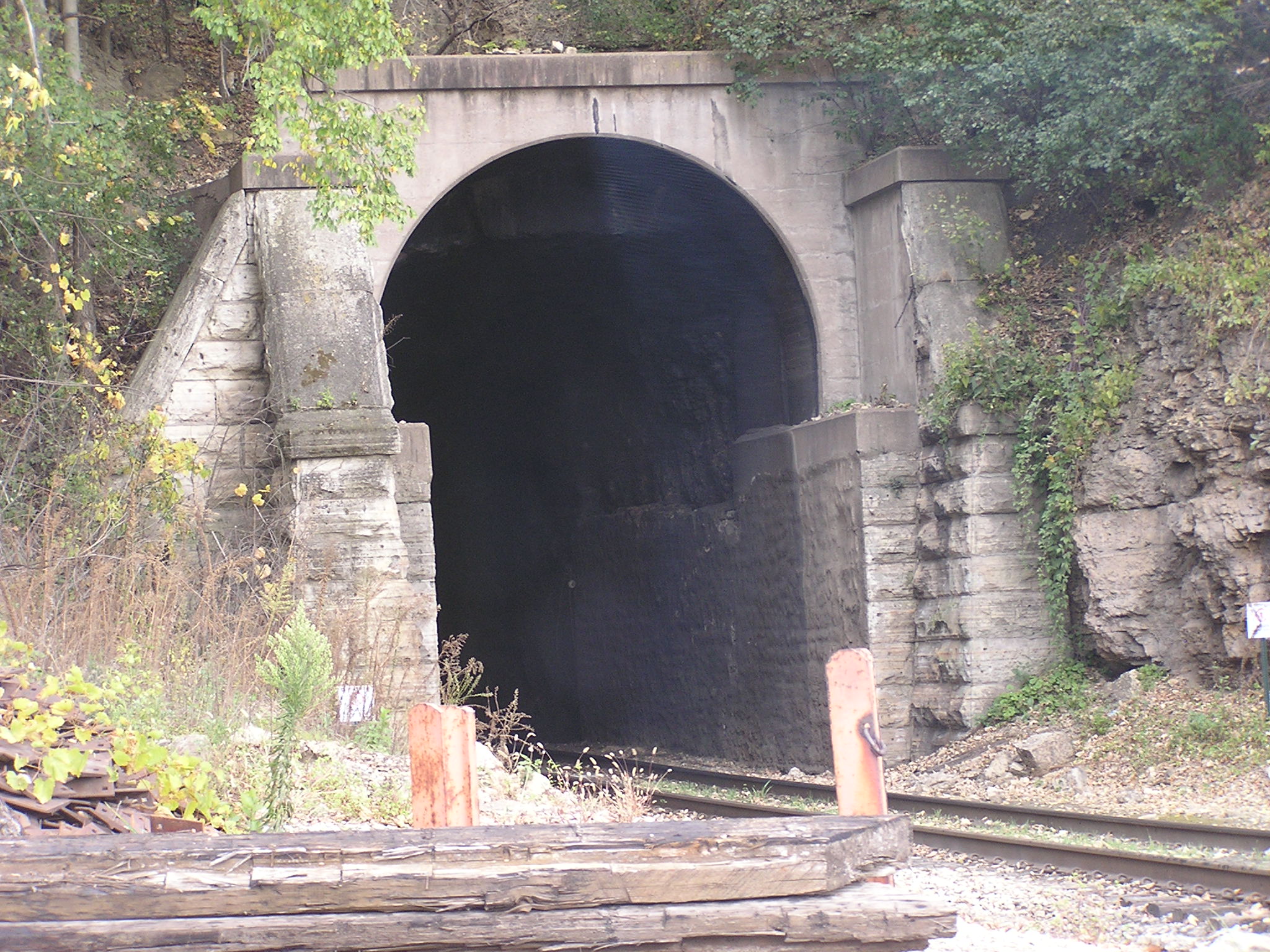
The east opening of the railroad tunnel.
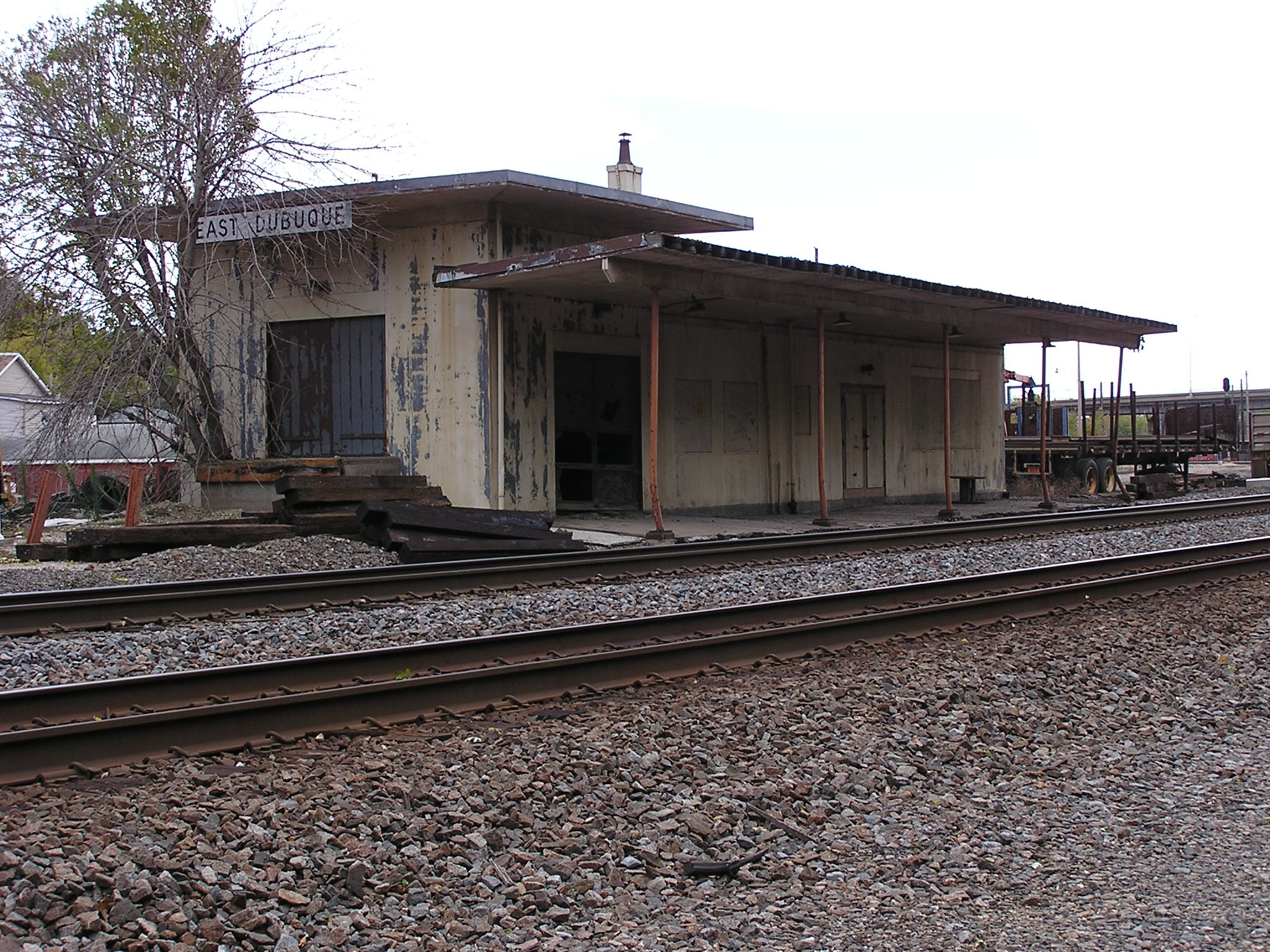
The old passenger depot which is a short way from
the east opening of the tunnel.
NAVY SCHOOL
The campus at the University of Wisconsin was very beautiful and
located on Lake Mendota. Upon arriving, I was assigned to a dorm room
with two other sailors.
Classes commenced and most of the students had a difficult time
getting started since they could not type or did not know Morse Code.
We began practicing taking code... no words, just letters and numbers,
six in a row, and thousands of rows everyday for hours. Because of the
intense training, we were warned about the possibility of having
disturbing dreams and the Navy provided psychiatrists to counsel with
us about any concerns we had.
They were right! I started to dream I was in a tunnel
and a carriage with four horses would chase me all night long. I
continued to dream the same dream night after night and finally went
to visit with one of the psychiatrists. He advised me to try to do
something to stop them in my next dream. As usual, that night I
dreamed the carriage was coming, so I gathered boxes of feathers and
built a fire under a large kettle of tar. You guessed it! I tarred
and feathered the horses and carriage and never had that dream again!
In addition to learning Morse Code, we spent time getting in shape
physically. Part of our exercise classes consisted of rowing a large
boat with eight sets of oars around Lake Mendota. During one
excursion, we got the oars all tangled up and started laughing. As a
result, he instructor tied us to the dock and made us row for an
hour. It seemed extreme to us young sailors, but he knew what he was
doing. Training for war was serious business and we never fooled
around again!
We were allowed to have every Saturday off from noon to 11 PM. Our
rooms were inspected that morning by an officer and if the room wasn't
spotless, we were denied our leave.
The NTSCH radio schooling lasted for twenty weeks and I thoroughly
enjoyed every minute!
After completion of telegraph school, a graduation ceremony was held
and some of the students were able to have family attend. An officer
walked out on the stage and asked, "Will Seaman 1st Class Tom Shepherd
stand up?" He announced that I was one of the youngest and the best
students enrolled in the school. (I never told them I already knew
Morse Code!) He then went on to say, "We have a keg of beer and plenty
of good food to eat at the party after the ceremony, but we do not
want to see Seaman 1st Class Tom Shepherd drinking any beer!" I was
seventeen years old and the legal drinking age in Wisconsin was
eighteen. I do remember drinking a few beers though!
Following graduation, I was shipped to the South Pacific and ended up
serving in the Philippine Islands. Upon discharge from the Navy, I
returned home to Iowa and went to the ICCR roundhouse to ask for my
job back as a depot agent. I told the man behind the counter I had
five years seniority and would like him to see about a position for
me. He left the room for a few minutes to check it out and when he
returned said there was an opening on the branch line in Minnesota. I
declined the offer, because I wanted to stay in Iowa so that was the
end of my telegraphing and railroading career!
Many thanks for reading my story. Looking back, it sure was a fun and
exciting time! The telegraph key, conductors, engineers, dispatchers,
and the railroad depot agents were all a part of the great steam
engine era.
Never forget how to dit, dit, dit, dah. I'm sure Hedy Lamarr would
like that!
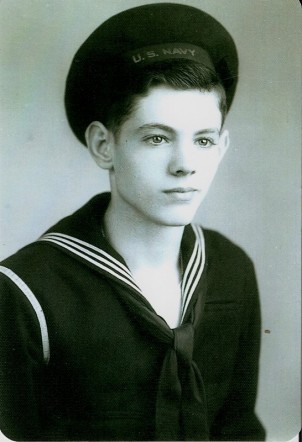
Tom Shepherd as a young sailor.


